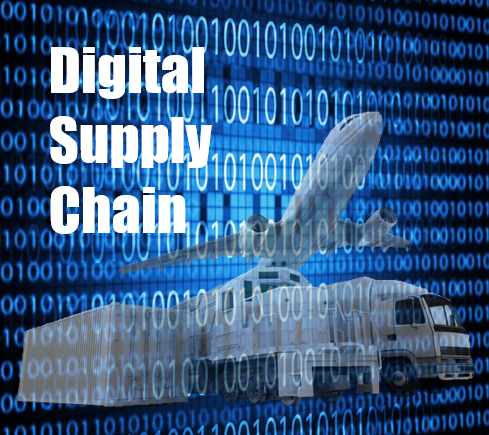The ground beneath businesses continues to shift as the impacts of e-commerce, new business models, digitization, and automation are fully felt. Many analysts are convinced that only companies successfully transforming themselves into digital enterprises will survive and thrive in the years ahead. Such a transformation, however, needs to include every aspect of a business, including its supply chain. Surely, that comes as no surprise. “Supply chain management is a field where Big Data and analytics have obvious applications,” notes Bernard Marr (@BernardMarr), a Strategic Performance Consultant. “Until recently, however, businesses have been less quick to implement big data analytics in supply chain management than in other areas of operation such as marketing or manufacturing.”[1] It’s not just big data and advanced analytics that are impacting supply chain operations. Adrienne Selko (@ASelkIWok) observes, “A host of potentially disruptive technologies are creating digital ‘always-on’ supply chains that will provide better efficiency, visibility, and customer service across a variety of industries.”[2] Those disruptive technologies include:
- Predictive analytics
- Robotics and automation
- Sensors and automatic identification
- Wearable and mobile technology
- Driverless vehicles and drones
- Inventory and network optimization tools
- Cloud computing and storage
- 3-D printing.
I’m assuming that Selko doesn’t use the term “disruptive” lightly. Because these technologies are disruptive, organizations need to transform in order to adapt to the future they are creating. The Internet of Things (IoT) is not specifically found on Selko’s list; but, clearly the IoT underpins every technology she does list. The value of the IoT is found not only in the connections it makes but in the data it generates. John Boucher, President and CEO of ModusLink Global Solutions, notes, “Connected devices used in the supply chain that take advantage of technology including sensors, GPS, and AutoID are collecting vast amounts of data, but unless you’re regularly being sent that data, filtering it, analyzing it and incorporating it into your supply chain strategy, then it’s safe to say this technology isn’t being used to its full advantage.”[3] Chris Gopal, a Global Supply Chain & Operations Consultant and Educator, explained to Dustin Mattison (@dustinmattison) that when a company does take full advantage of available technologies it creates an intelligent supply chain. “The intelligent supply chain essentially manages, at high speed, all the various product and information movements, risks and events that occur in the global supply chain,” Gopal stated. “So, for instance, it’s collecting information from a wide variety of sources, everything from customers to suppliers and everything in between. It’s dashboards to understand very quickly what’s going on. It’s analytics to figure out not only what went on and what is happening at the present, but what will go on. And then lastly, it’s talent management and the capabilities of the people to interpret this and to manage the supply chain. So, intelligence involves information, data, analytics, response, strategy, and people.”[4]
Whenever adjectives like “intelligent” or “smart” are used in association with business operations or processes, you can be reasonably sure that a cognitive computing system is operating somewhere in the background. That’s why I prefer the term “cognitive value chain” to “intelligent supply chain.” Cognitive computing systems, like the Enterra Enterprise Cognitive System™ (ECS) — a system that can Sense, Think, Act, and Learn® — can deal with the growing number of variables contained in structured and unstructured data that can affect supply chain operations. In addition, a cognitive computing system can provide insights, make autonomous routine decisions (i.e., Cognitive Process Automation), and provide a single version of the truth than can be used to help corporate alignment. I define cognitive computing as a combination of artificial intelligence, advanced mathematics, and natural language processing. You need all of those capabilities in order to make the transformation into a digital enterprise. Rod Johnson, a group vice president at Oracle, told Katherine Noyes (@noyesk) that a digital supply chain is quickly becoming a “must have” capability. “Factors such as changing customer preferences, commodity prices, global unrest and weather patterns are all ‘putting enormous pressure on supply-chain leaders to make sure they get the right product to customers at the right price and the right time,'” Johnson stated. “Today we’re relying on real-time signals to tell us what the real demand is. Most of the leading companies are trying to do same-day changes to production, sometimes even adjusting hourly.”[5]
You simply can’t achieve what Johnson describes without leveraging artificial intelligence (AI). The amount of data that needs to be analyzed (especially if that analysis is required in near-real-time) is simply too large to be analyzed by any other means than AI. Andrew Armstrong, a business owner and digital marketing strategist, notes, “Companies today are nearly overrun with massive amounts of data about their customers, suppliers, and even potential markets thanks to evolving digital technologies. While it’s commonly said that information is power, if you don’t make proper use of that data, it’s all but useless. The adage holds true when it comes to crunching numbers to benefit a crucial business capability such as the supply chain.”[6] He adds, “Companies that make use of Big Data analytics can quickly begin addressing their greatest supply chain challenges. Those that do not may miss out on huge efficiency gains and on the chance to grab a competitive advantage.” Boucher agrees with that conclusion. He explains:
“Big data and its resulting real-time analysis complement the end-to-end visibility of your supply chain and enable you to act quickly enough to prevent problems resulting in revenue and profit loss at various points in the supply chain. Here are the three areas of the supply chain I think will be most heavily impacted by real-time data analytics:
- Forecasting: Inaccurate forecasting = trampled success. If you make too much, you’re wasting cash and losing profit. If you make too little, you’re missing revenue. If you make it at the wrong time, all three issues are probably hitting you simultaneously. By implementing fluid demand and supply plans that are updated in real-time, based on true demand signals, material availability and capacity, your revenue and profit potential is maximized.
- Shipping: By incorporating real-time data analytics into your plan, you can mitigate the risk associated with a variety of disasters. By tracking products with GPS, you can know exactly where a shipment is in the event it needs to be re-routed or if it is lost. New routes can be identified quickly and efficiently. If a port strike happens as your products are entering port, you’ll already know this due to your tracking technologies. Analytics can help determine the closest available port and route to take, simulating potential options and preventing your products from sitting stagnant for two weeks at sea.
- Warehousing: Analytics on warehouse layout, product inventory and demand can help optimize operations within the warehouse, with simulations preventing physical resources from being expended before the plan is finalized. Once a solution is enacted in the physical warehouse, rules can be applied to ensure management is alerted to depleted inventory or potential roadblocks.
Supply chain professionals have begun to understand how better visibility through big data analysis can improve performance and efficiency, but many of them are just at the tip of the iceberg; there is so much more that can be done.”
In order to take full advantage of today’s technologies, I believe companies should invest in a cognitive computing system that can orchestrate all of the digital processes that will help them transform into digital enterprises. Cognitive computing capabilities can help every aspect of a business, especially supply chain operations.
Footnotes
[1] Bernard Marr, “How Big Data And Analytics Are Transforming Supply Chain Management,” Forbes, 22 April 2016.
[2] Adrienne Selko, “How to Deal with ‘Always-On’ Supply Chains,” Material Handling & Logistics, 20 April 2016.
[3] John Boucher, “Betting Big on Data in the Supply Chain,” EBN, 31 March 2016.
[4] Dustin Mattison, “The Intelligent Supply Chain,” Supply Chain Expert Community, 26 April 2016.
[5] Katherine Noyes, “Why analytics is eating the supply chain,” Computerworld, 29 April 2016.
[6] Andrew Armstrong, “Big Data Analytics and the Evolution of the Supply Chain,” Tech.Co, 23 May 2016.





